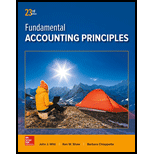
Fundamental Accounting Principles
23rd Edition
ISBN: 9781259536359
Author: John J Wild, Ken Shaw Accounting Professor, Barbara Chiappetta Fundamental Accounting Principles
Publisher: McGraw-Hill Education
expand_more
expand_more
format_list_bulleted
Concept explainers
Textbook Question
Chapter 9, Problem 2DQ
Why does the direct write-off method of accounting for
Expert Solution & Answer
Want to see the full answer?
Check out a sample textbook solution
Students have asked these similar questions
Need help with this accounting questions
Hi teacher please help me this question general accounting
Does the pattern of variances suggest Pro Fender's managers have been making trade-offs?
Chapter 9 Solutions
Fundamental Accounting Principles
Ch. 9 - Prob. 1DQCh. 9 - Why does the direct write-off method of accounting...Ch. 9 - Prob. 3DQCh. 9 - Why might a business prefer a note receivable to...Ch. 9 - Prob. 5DQCh. 9 - Prob. 6DQCh. 9 - Prob. 7DQCh. 9 - Prob. 8DQCh. 9 - Prob. 9DQCh. 9 - Prob. 10DQ
Ch. 9 - Prob. 1QSCh. 9 - Prob. 2QSCh. 9 - Prob. 3QSCh. 9 - Distinguishing between allowance method and direct...Ch. 9 - Prob. 5QSCh. 9 - Prob. 6QSCh. 9 - Prob. 7QSCh. 9 - Prob. 8QSCh. 9 - Prob. 9QSCh. 9 - Prob. 10QSCh. 9 - Prob. 11QSCh. 9 - Prob. 12QSCh. 9 - Prob. 13QSCh. 9 - Prob. 1ECh. 9 - Prob. 2ECh. 9 - Prob. 3ECh. 9 - Prob. 4ECh. 9 - Prob. 5ECh. 9 - Prob. 6ECh. 9 - Prob. 7ECh. 9 - Prob. 8ECh. 9 - Prob. 9ECh. 9 - Prob. 10ECh. 9 - Prob. 11ECh. 9 - Prob. 12ECh. 9 - Prob. 13ECh. 9 - Prob. 14ECh. 9 - Prob. 15ECh. 9 - Prob. 16ECh. 9 - Prob. 17ECh. 9 - Prob. 1APSACh. 9 - Prob. 2APSACh. 9 - Problem 9-3A Aging accounts receivable and...Ch. 9 - Prob. 4APSACh. 9 - Prob. 5APSACh. 9 - Prob. 1BPSBCh. 9 - Prob. 2BPSBCh. 9 - Prob. 3BPSBCh. 9 - Prob. 4BPSBCh. 9 - Prob. 5BPSBCh. 9 - Business Solutions P1 P2 SP 9 Santana Rey, owner...Ch. 9 - Prob. 1GLPCh. 9 - Prob. 1BTNCh. 9 - Prob. 2BTNCh. 9 - Prob. 3BTNCh. 9 - Prob. 4BTNCh. 9 - Prob. 5BTNCh. 9 - Prob. 6BTNCh. 9 - Prob. 7BTNCh. 9 - Prob. 8BTNCh. 9 - Prob. 9BTN
Knowledge Booster
Learn more about
Need a deep-dive on the concept behind this application? Look no further. Learn more about this topic, accounting and related others by exploring similar questions and additional content below.Similar questions
- Green Co. incurs a cost of $15 per pound to produce Product X, which it sells for $26 per pound. The company can further process Product X to produce Product Y. Product Y would sell for $30 per pound and would require an additional cost of $10 per pound to be produced. The differential cost of producing Product Y is: a. $15 per pound b. $26 per pound c. $30 per pound d. $10 per poundarrow_forwardFinancial Accountingarrow_forwardWhen a company pays cash for a truck, what is the effect on the accounting equation for that company? A. Increase assets and increase liabilities. B. Decrease assets and decrease liabilities. C. Increase assets and increase equity. D. No net change.arrow_forward
- NO WRONG ANSWERarrow_forwardBaltimore Company experienced an increase in total assets of $12,500 during the current year. During the same time period, total liabilities increased $9,100. Shareholders made no investments during the and no dividends were paid. How much was Baltimore's net income? yeararrow_forwardWhich of the following statements are true with regard to asset accounts? a. Assets are on the left side of the accounting equation. b. Assets are the right-side of the accounting equation. c. Assets are increased with debits Assets are increased with credits. d. Assets are decreased with debits Assets are decreased with credits.arrow_forward
- Compute the number of units sold in 2016?? General accountingarrow_forwardBlue Fin started the current year with assets of $840,000, liabilities of $420,000, and common stock of $240,000. During the current year, assets increased by $480,000, liabilities decreased by $60,000 and the common stock increased by $330,000. There was no payment of dividends to owners during the year. What was the amount of Blue Fin's change in total stockholders' equity during the years? A. $420,000 increase B. $300,000 increase C. $240,000 increase D. $540,000 increasearrow_forwardNonearrow_forward
arrow_back_ios
SEE MORE QUESTIONS
arrow_forward_ios
Recommended textbooks for you
- Principles of Accounting Volume 1AccountingISBN:9781947172685Author:OpenStaxPublisher:OpenStax College
 Individual Income TaxesAccountingISBN:9780357109731Author:HoffmanPublisher:CENGAGE LEARNING - CONSIGNMENT
Individual Income TaxesAccountingISBN:9780357109731Author:HoffmanPublisher:CENGAGE LEARNING - CONSIGNMENT  College Accounting, Chapters 1-27AccountingISBN:9781337794756Author:HEINTZ, James A.Publisher:Cengage Learning,
College Accounting, Chapters 1-27AccountingISBN:9781337794756Author:HEINTZ, James A.Publisher:Cengage Learning,

Principles of Accounting Volume 1
Accounting
ISBN:9781947172685
Author:OpenStax
Publisher:OpenStax College


Individual Income Taxes
Accounting
ISBN:9780357109731
Author:Hoffman
Publisher:CENGAGE LEARNING - CONSIGNMENT



College Accounting, Chapters 1-27
Accounting
ISBN:9781337794756
Author:HEINTZ, James A.
Publisher:Cengage Learning,
Accounts Receivable and Accounts Payable; Author: The Finance Storyteller;https://www.youtube.com/watch?v=x_aUWbQa878;License: Standard Youtube License